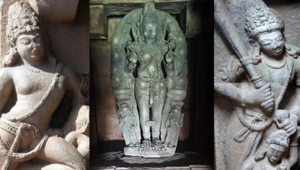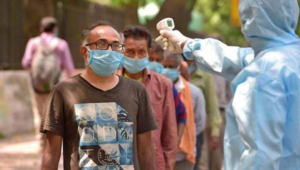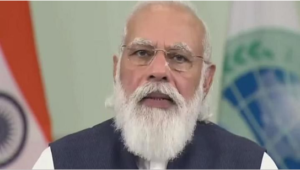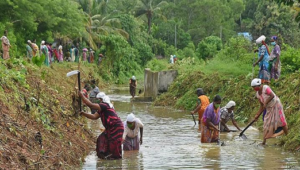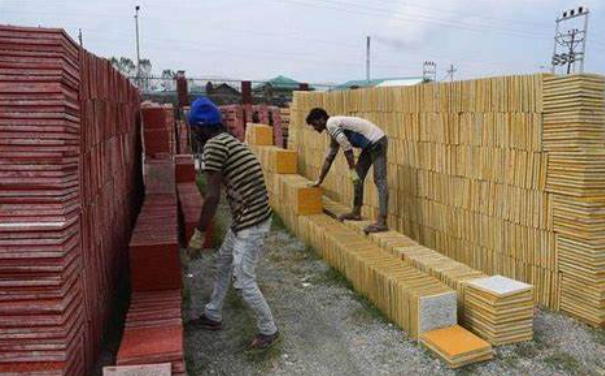
The News Editorial Analysis 27th Jan 2022
Fewer hospitalisations in third wave, data from States show
With India continuing to be in the grip of the third wave of the coronavirus, hospitalisation trends from major States suggest it is so far less pernicious than previous waves.On Wednesday, India reported 2,82,371 fresh cases, taking the active caseload to over 22.2 lakh. States that account for a major chunk of these cases say that more than 95% of their available hospital beds are unoccupied, a far cry from the previous waves when people scrambled for elusive beds in hospitals across the country.Rajasthan has around 90,000 active cases with 84,000 beds available for treating COVID-19 patients. Medical and Health Minister Parsadi Lal Meena said this week that only 2% of these beds were occupied.At the Rajasthan University for Health Sciences (RUHS) Hospital in Jaipur, which is the biggest government medical facility for COVID treatment in the State, 63 of the 895 oxygen-supported beds and 26 of the 305 ICU beds with ventilator were occupied as on January 25.During the peak of the second wave in April-end in 2021, almost all the beds available in the government and private medical facilities were occupied by COVID-19 patients.Active cases in Kerala, which is reporting a massive spike in infections, have climbed to 2,60,000. However, around 3.5% have been admitted in hospitals and COVID first line/second line treatment centres. This is in stark contrast to the situation in the State during the Delta wave last April when around 22,726 — close to 8% — were hospitalised. The daily new admissions at the time was close to 4,500. “The focus is firmly on home care, unlike last time. We do not want mild cases to flood our hospitals, occupying the beds which should be kept free for those who develop serious disease. Most of the patients who are rushing to the emergency wing demanding admissions are being examined and then counselled to remain home and seek tele-consultation if required,” said a State official.
However, as far as COVID deaths are concerned, the State’s pattern is not very different from previous waves, with 30-35 deaths reported daily.In Karnataka, a comparison revealed, analysis by the Health Department found that COVID-19 hospitalisation in the State stood at 21% during the peak of the second wave while it was 16% during the corresponding period in the first wave. In the third wave, so far, the rate of hospitalisation has not crossed 5%.During the first and second waves, the highest number of active cases was recorded on October 10, 2020, (1,20,929) and May 15, 2021, (6,05,494) respectively. In the third wave, the State saw 3,62,487 active cases, the highest so far. A total of 25,992 COVID-19 patients died during the second wave while the first claimed 12,331 lives.In the third, 333 fatalities have been recorded till January 25. Karnataka had around 3,50,000 active cases, of which around 2% are hospitalised.
In Telangana too, the current COVID-19 admissions at government and private hospitals in Telangana are fewer than that observed during the peak or decline of the second wave. The second wave in the State peaked in April-2021, at around 10,000 cases a day, with around 4,000 requiring treatment in the Intensive Care Unit (ICU). Presently around 4,000 are detected with COVID in a day. The ICU beds occupancy was 832 as of Monday.In Tamil Nadu, when hospitalisations as on January 24 was compared with that on May 15, 2021, the percentage of active cases that were hospitalised was only 5.1 % compared to 31.8 %. On both days, the State had around 200,000 active cases. The State has also reported far fewer deaths during the third wave so far compared to the second wave. Between March 19, 2021 (when the cases reported daily crossed the 1,000 mark during the second wave ) and May 21, 2021 (when the cases peaked), the State reported 9.08 lakh cases and 7,025 deaths.In comparison, between December 31, 2021 and Monday, the State reported 4.17 lakh cases, which is 46 % of the cases reported during the period taken for comparison. However, it reported 499 deaths, which is only 7 % of the deaths reported in the compared period.On January 23, Maharashtra — that has historically recorded among the highest cases during all three waves — registered 40,805 new COVID patients and 44 deaths with close to 300,000 active cases. Delhi also reported a peak of cases during the second wave on April 20, 2021
Unlock India’s food processing potential
Growing populations and unrestricted use of natural resources must push nations to have an efficient food value chainThe answer concerns every living being. Food connects us all and is tied to our community, traditions, our past and our future. The challenge to feed the 10 billion population by mid-century is therefore being deliberated on several fronts. It demands efficient ways of production that are both economically viable and ecologically sustainable. Fortunately, technologies are emerging that revamp the traditional approach of farm to fork and with a lower environmental footprint. One of the largest producers of fruits and vegetables in the world to boost processed food in large quantities, India has formulated a unique Production-Linked Incentive Scheme (PLIS) which aims to incentivise incremental sales.
Progress so far
A sum of ₹10,900 crore has been earmarked for the scheme and to date, 60 applicants have already been selected under Category 1 (https://bit.ly/3rMdqTc) which incentivises firms for incremental sales and branding/marketing initiatives taken abroad. Beneficiaries have been obliged to commit a minimum investment while applying for the scheme. Assuming the committed investment as a fixed ratio of their sales and undertaking execution of at least 75% of the projects, the sector is likely to witness at least ₹6,500 crore worth of investment over the next two years.
A study in the United States concluded that a 1% increase in public infrastructure increased the food manufacturing output by 0.06% in the longer run (https://bit.ly/3rOeE0l). This correlation holds good for India too as a higher investment is being concentrated in States such as Andhra Pradesh, Gujarat, Maharashtra, Tamil Nadu and Uttar Pradesh. These States as reported by the Good Governance Index 2020-21, ranked among the highest in the ‘Public Infrastructure and Utilities’ parameter with ‘Connectivity to Rural Habitations’ showing the highest improvement (https://bit.ly/3nZ98Xz). For the exports market, it is now established that sales promotion is positively related to increased sales volume, but inversely related to profitability. To bridge this gap, of the 13 key sectors announced under the PLIS, the ‘Food Processing PLIS’ earmarks a dedicated Category 3 for supporting branding and marketing activities in foreign markets. This ensures that India’s share of value-added products in the exports basket is improved, and it may leverage on its unique geographical proximity to the untapped markets of Europe, the Middle East/West Asia, Africa, Oceania and Japan.
Easing access to credit
As a result of the novel coronavirus pandemic, the past two years have been witnessing a significant number of people working from home. This has accelerated the demand for products from the ready-to-eat market which saw a rise of approximately 170% in sales volume between March-June 2020, as stated by Netscribes (global data and insights firm). The pandemic has bolstered consumer awareness of functional foods, which is expected to provide a launchpad for health-orientated start-ups and micro-food processing units. However, the access of micro, small, and medium enterprises (MSMEs) to finance is a perennial problem in the country, predominating due to a lack of proper credit history mechanism for MSMEs.
Smart financing alternatives such as peer-to-peer (P2P) lending hold potential for micro-food processors as can be observed by the United Kingdom Government-owned British Business Bank (akin to India’s MUDRA Bank, or Micro Units Development and Refinance Agency Bank) which has helped more than 1,18,000 small businesses get access to more than U.S.$17.88 billion (https://bit.ly/3Aziz4T). Access to working capital has in theory been addressed by the Trade Receivables Discounting System (TReDS), a platform for facilitating the financing/discounting of trade receivables of MSMEs through multiple financiers.
However, the platform requires considerable scaling-up and simultaneous enforcement of stringent measures for corporates to comply with. Integrating the TReDS platform with the Goods and Service Tax Network’s e-invoicing portal will make TReDS more attractive and give relief to financiers.
A sustainable food ecosystem
With growing populations, changing food habits and unrestricted use of natural resources, nations must come together and lay out a road map for a common efficient food value chain. New alternatives are being explored which have immense potential in replacing the staples of rice and wheat in the form of Nutri-cereals, plant-based proteins, fermented foods, health bars and even fresh fortified foods for pets. By welcoming the new brands in the category, PLIS aims to create an enabling ecosystem for innovation in both food products and processes. Post the 1929 Great Depression, hemlines of a skirt were indexed to predict the financial state. Almost a century later, luminosity and night lights data obtained from satellites indicate the extent of economic progress. No wonder, 50 years hence, the progress of nations will be benchmarked to their ability to sustainably feed their populations.Harsh Vardhan, an IIM-Ahmedabad graduate, is a thought leader for Invest India (under the Department for Promotion of Industry and Internal Trade, Ministry of Commerce and Industry, Government of India)
PM to hold Central Asia summit today
Trade, connectivity on the agenda for the conference; Afghanistan situation also to be taken upPrime Minister Narendra Modi will hold the first India-Central Asia summit on Thursday, in a videoconference with five Presidents from Kazakhstan, Kyrgyzstan, Tajikistan, Turkmenistan and Uzbekistan. Government officials said the major areas of focus for the conference would be trade and connectivity, building development partnerships and enhancing cultural and people-to-people contacts, but it is clear that a number of global and regional developments will also form a large part of the discussions, set to begin around 4.30 p.m IST.During the conference, the countries are expected to propose ways to increase trade between India and the region, which is only about $2 billion at present, most of which comes from energy imports from Kazakhstan. India extended a $1 billion Line of Credit (LOC) for development projects in the areas of energy, healthcare, connectivity, IT, and agriculture in 2020 and proposes to increase the number of educational opportunities for students from Central Asian countries. In addition, India hopes to build on its trilateral working group on Chabahar with Iran and Uzbekistan to strengthen connectivity to the region.Meanwhile, other developments like the COVID-19 are expected to be discussed, and in particular rebuilding economies affected by pandemic. This has also been a major subject for the Shanghai Cooperation Organisation (SCO) where India and the Central Asian countries are members along with Russia, China, Iran and Pakistan. The five leaders including Kazakhstan’s Kassym-Jomart Tokayev,Kyrgyzstan’s Sadyr Japarov, Tajikistan’s Emomali Rahmon, Turkmenistan’s Gurbanguly Berdimuhamedov and Uzbekistan’s Shavkat Mirziyoyev were due to be chief guests at the Republic Day parade in Delhi on Wednesday, but their visits were cancelled due to the current wave of coronavirus cases in India.
The growing tensions between Russia and NATO countries over the troop build-up on the Ukraine-Russia border, which Moscow says is in response to plans for NATO expansion in East Europe, will cast a shadow over the meeting as well, given the close strategic ties between Russia and the five former Soviet States, as well as Russian ties with India. During the recent uprising in Kazakhstan, President Tokayev had received support from Russian President Vladimir Putin, who dispatched Russian Army soldiers to help restore the situation.The situation in Afghanistan, which was discussed at length at the SCO, and in November by National Security Advisers at an India-Central Asia meet hosted by NSA Ajit Doval, as well as at the meeting of India-Central Asia Foreign Ministers in December will also come up.Despite statements from several multilateral groupings, the Taliban regime in Kabul is yet to agree to forming an inclusive government, restoring education for girls of all ages, and giving concrete guarantees on preventing terrorist groups from operating in Afghanistan. Not all Central Asian countries are on the same page as India on dealing with the Taliban, and with the exception of Tajikistan, all have exchanged high level diplomatic visits with Kabul, while at least two, Uzbekistan and Turkmenistan have reopened their missions in Afghanistan.
Drunk driving cannot be treated leniently, says SC
Drunken driving cannot be treated leniently even if the accident turned out to be a minor one, the Supreme Court has said in a judgment.Driving under the influence of alcohol is an offence. It amounts to playing with the lives of others, a Bench of Justices M.R. Shah and B.V. Nagarathna observed in a recent verdict.The case concerned a truck driver with the Provincial Armed Constabulary (PAC) who rammed into a jeep while ferrying personnel to Allahabad on Kumbh Mela duty in February 2000. He was found to have been drunk while driving the truck.The man was subsequently dismissed from service. His plea that the punishment was disproportionate to his deed was rejected by the lower courts. Dealing with his appeal, Justice Shah said that, “Merely because there was no major loss and it was a minor accident cannot be a ground to show leniency. It was sheer good luck that the accident was not a fatal accident. It could have been a fatal accident.”
Keeping faith
People-to-people initiatives can help build goodwill between India and PakistanAt a time when most other India-Pakistan exchanges are suspended, even a simple proposal by the Pakistan Hindu Council, forwarded by Pakistan to India, to allow pilgrims of both countries to travel by air to avoid cumbersome journeys seems a leap. Islamabad-Delhi ties now are possibly at their worst ever in peace times, with no political dialogue at a bilateral or multilateral level for over five years. After many terror attacks, India has stopped normal communications and cultural exchanges, and after the Government’s moves on Article 370 in Jammu and Kashmir, Pakistan stopped all trade ties. Both sides have downsized their diplomatic missions. In addition, the COVID-19 pandemic has ensured that the borders have been virtually sealed for two years, with few direct routes operating between them. Even the movement of pilgrims may have been cancelled but for the conscious attempt by the two governments to make an exception for faith-based travel — as was done for the Kartarpur corridor that came up in 2019, the same year the two countries nearly went to war over the Pulwama attack. Religious exchanges, of mainly Muslim pilgrims from Pakistan, and Hindus and Sikhs from India, are governed by a protocol signed in 1974, and allowed to continue.
While the routes for Sikh pilgrims, from Indian Punjab to the Pakistani Punjab province, are relatively easy, hundreds of Indian and Pakistani pilgrims crossing over at the Wagah/Atari border to travel further to the Hinglaj Mata Mandir in Balochistan, the Paramhans Mandir in Khyber Pakhtunkhwa, the Ajmer Sharif dargah in Rajasthan, the Nizamuddin Aulia in Delhi and other such shrines, face more circuitous routes. To avoid the extra time in travel, the Pakistan Hindu Council, which has now signed an MoU with Pakistan International Airlines (PIA) to facilitate faith-based tour groups, has asked that PIA charters from Karachi and Lahore be allowed to fly direct to Indian cities this week, with a view to also allowing reciprocal air charters from India. This would be the first time such air travel has taken place in years, and the first time ever that pilgrimages would be accorded this facility. As pilgrim groups on both sides are vetted before being allowed to travel, the precedent is unlikely to pose any additional security threat. In an atmosphere fraught with tensions, such people-to-people initiatives can only help build some modicum of goodwill. No evident harm to national interests has come from other such recent moves embarked on by the two governments, such as the LoC ceasefire announcement in February, or the decision to reopen the Kartarpur corridor in November, or the Government’s nod for cricket under the T20 World Cup as well as other sporting events. While the Government’s reflex position may be to deny the request, it may prove wiser to give the proposal some deliberate consideration.
Taxing drama
The Centre must conclude the retroactive tax disputes and ensure policy predictability
In what should be the last act of a long and winding tax dispute drama, British firm Cairn Energy has said it has concluded all steps prescribed by the Indian government in order to be eligible for the refund of a contentious retroactive tax levy. The firm, now rechristened as Capricorn Energy, expects to get back ₹7,900 crore. Cairn Energy was the second major firm pursued by the I-T Department for taxes it believed had accrued in the past, using retro-active legislative changes introduced in the 2012 Budget by then Finance Minister Pranab Mukherjee. The original target for this move, that has sharply dented India’s credibility, was Vodafone, which had secured a Supreme Court verdict against the tax department’s demands for past transactions. Empowered to dig up similar transactions, involving the indirect transfer of assets situated in India, the I-T Department had, since 2014, pursued Cairn over a group restructuring undertaken in 2006, culminating in a tax demand of as much as ₹24,500 crore. Cairn and Vodafone had initiated arbitration proceedings against the Indian tax authorities’ actions, and won in late 2020. But in Cairn’s case, the taxman had recovered part of its ‘dues’ by forcibly selling its shares even as arbitration proceedings were pending — an action that led to The Hague awarding it penal damages of $1.2 billion.
As part of the Government’s compromise formula worked out belatedly last August through amendments in the tax law, Cairn had to drop all legal proceedings seeking to enforce the arbitration award against India, forgo the damages and indemnify the Government against all future claims or liabilities. Last month, Vodafone also availed these provisions. The Government should, on its part, work swiftly to process their paperwork and preferably remit their dues before the financial year concludes. While this will be a necessary first step towards restoring some of the damage caused to Brand India, it may not be immediately sufficient — from labelling it as tax terrorism while in the Opposition, this government dithered on corrective action till its eighth year in office. Even in the eight months following the loss of the Cairn arbitration, it shuffled its feet, from denial and obfuscation to working out legal amendments to fix the mess. The only ostensible trigger for the change was global courts approving seizure of Indian assets as Cairn sought to enforce the arbitration award. Whether this was an outcome of bureaucratic bravado, official obstinacy, political paralysis or a combination of all three, India needs to abandon such fickleness and demonstrate greater certainty and predictability across economic policy, be it about GST or global trade engagement, in order to bolster its credentials as an ideal investment destination.
Decommissioned INSKhukri to be converted into museum
The Navy vessel handed over to Diu administrationINS Khukri, the lead ship of the Indian Navy’s Khukri class missile corvettes which was decommissioned last December, was on Wednesday handed over to the Diu administration to be converted into a museum.The ship is planned to be developed as a full-scale museum, the Navy said in a statement.As part of developing and revitalising the Khukri Memorial, the Diu administration had approached the Defence Ministry in 2019 for gifting to it, for public display, a decommissioned naval vessel, the Navy said. “The ship commenced her last journey under tow by Navy ships from Visakhapatnam and arrived at Diu on January 14, it stated.Built by Mazagon Dock Shipbuilders, Khukri was commissioned on August 23, 1989 in Mumbai by the then Defence Minister Krishna Chandra Pant and Ms. Sudha Mulla, wife of late Capt. Mahendra Nath Mulla, MVC.After over 32 years of service and having participated in all forms of naval operations, the ship was decommissioned in a solemn ceremony on December 23, 2021 when the national flag, naval ensign and decommissioning pennant were lowered at sunset in the presence of Vice-Admiral Biswajit Dasgupta, Flag Officer Commanding-in-Chief, Eastern Naval Command, the statement said.
India probes China, Vietnam over ‘dumping’ of vinyl tiles

DGTR opens investigation on plaint from Welspun groupIndia has initiated an anti-dumping probe against imports of a certain type of tiles, used for covering the floors in residential and commercial buildings, from China, Taiwan and Vietnam following a complaint by domestic players.The Commerce Ministry’s investigation arm Directorate General of Trade Remedies (DGTR) is probing the alleged dumping of “vinyl tiles other than in roll or sheet form”.Welspun India Ltd., Welspun Flooring Ltd. and Welspun Global Brands Ltd. had filed a petition to impose anti-dumping duty on the imports from China, Taiwan and Vietnam, according to a notification of the DGTR.The applicants, it said, had alleged the dumping of the product was affecting domestic industry which started commercial production in September 2019.“On the basis of the duly substantiated written application by or on behalf of the domestic industry, and having satisfied itself, on the basis of the prima facie evidence submitted by the industry about the dumping… the authority hereby initiates an investigation,” the directorate said.If it is established that the dumping has caused material injury to the domestic players, the DGTR would recommend an anti-dumping duty on these imports.Countries start anti-dumping probes to determine whether their domestic industries have been hurt because of a surge in cheap imports.As a countermeasure, they impose these duties under the multilateral regime of the World Trade






